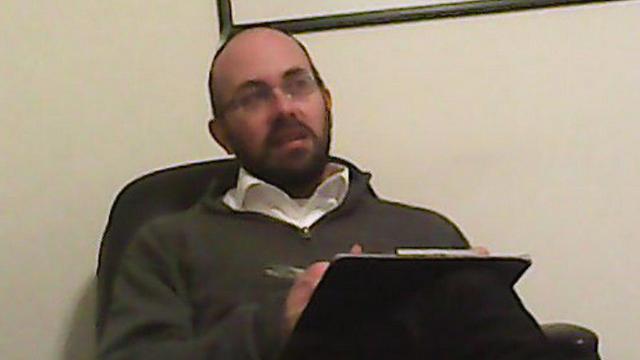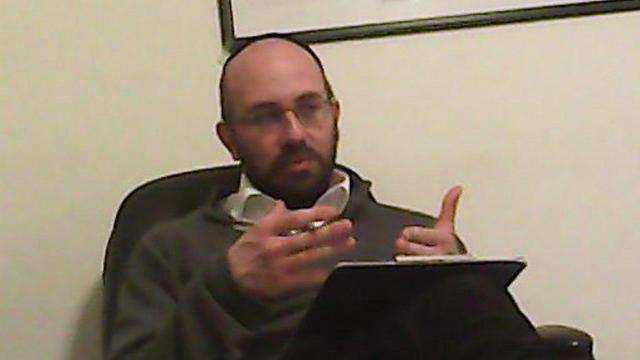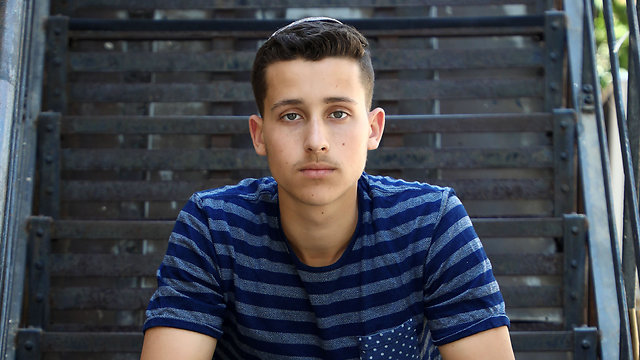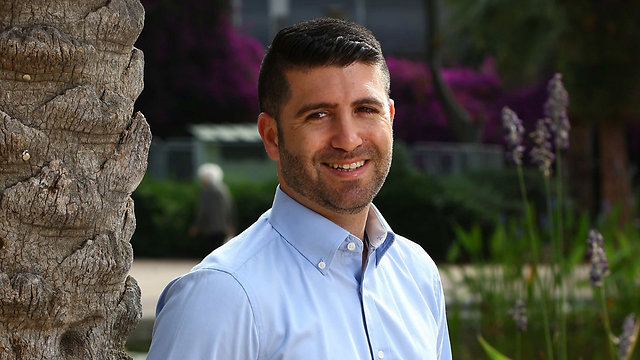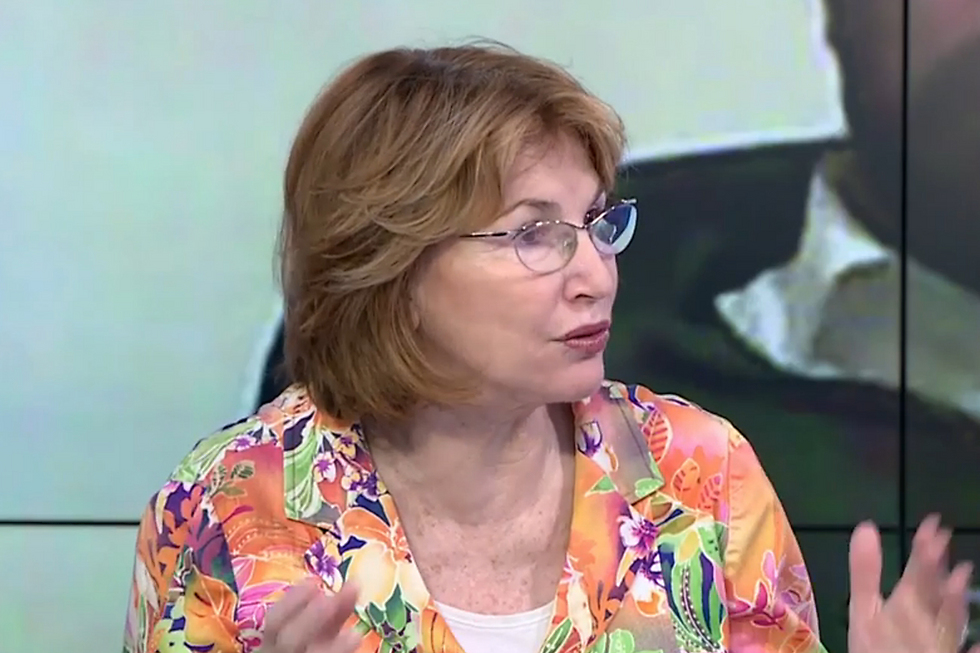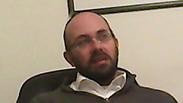

An inside look into 'sexual orientation conversion therapy'
Clinical psychologist Dr. Elan Karten tries to turn his patients from gay to straight by using a secret workshop and intense treatment; 'It's not like you're born this way,' he determines; Health Ministry meanwhile dragging its feet with regard to an investigation over a complaint filed against Karten.
When I saw the description of Karten's work on his website, I couldn't believe that this was being said so openly, not disguised or presented in any other way than what it was.
I was slightly apprehensive when I entered the small makeshift clinic. After all, I have never done something like this before—a journalistic investigation into a clinic that proffers conversion therapy, claiming to be able to make a gay man straight.
Dr. Karten sat down in front of me. "Hey, I'm Oren, I'm scheduled for eight o'clock," I said. "Yes, Oren, sit down please," he said, gesturing to a worn-out couch.
I expected him to be suspicions, but he quickly got to the point. "It's not like you were born this way," he ruled. He said that he sees homosexuality as a "need to compensate for something. You don't get there from a place of self confidence. You get there from feelings of inferiority. There's a reason that homosexuals want it to be genetic. It precludes them from trying to change."
Karten then opened what looked like a children's book in English. On the first page there was a drawing of a child looking at his father in admiration, while his mother stands on his other side, scolding him.
"Let me explain to you how this works," he said and flipped the page. On the next page there is a drawing of a sad and lonely child and above it a text saying "I wish my dad would spend more time with me instead of shouting at me." According to Karten, the absence of a dominant father figure is the cause of homosexuality.
"There is a hunger for a father. The more I identify with my father, the more I can internalize that I'm also a man. When that doesn't happen, I need to search for it. The homosexual tendency is in fact an urge to fix something, despite the emotional deprivation," he said.
I asked him if he truly believed that treatment had a chance to succeed, and if he thinks that I could do it. In response, Karten pulled a binder from his closet containing letters written to him by his patients. He then started reading me one of them.
"Next Wednesday I'll start dating for the first time, God willing. I know that the tendency isn't gone and I'm dealing with it, but I know that I have the tools to do so. It's clear to me that the level of attraction has gone down significantly," he read.
The doctor finished reading, looked at me and said, "If he succeeded, there's no reason that someone else won't. Even though there is an attraction, it doesn't mean that you have to give in to it."
Unlike the common psychological practice, in which the patient talks about himself, in this case the practitioner gave me something of a lecture, leaving me with very little room to respond. "I know you didn't choose this," he told me. "You didn't want this, right? It's not something you wanted to have happened, and you're not glad that it did."
I was split between my job as an investigative journalist and what this experience has personally awakened in me, but I settled for a wordless nod.
"They say that homosexuality is natural," Karten continued. "But when you use cocaine, it can also feel natural, so what does that mean? That it's good and right for you?"
Over the course of the discussion, it was pretty clear that there is no debate over whether homosexuality is a good thing or not. Rather, it was made clear that it wasn't something you could live with.
The only thing that kept going was the fact I'm a mature 30-year-old man who is happy with who he is, but someone else, someone younger who is not in such a good place in life, would probably be crushed.
The workshop that can cure your homosexuality
Dr. Karten is a US-trained clinical psychologist who received his license to practice in 2011. On the website of the Brothers' Road (Brothers on a Road Less Traveled, formerly called People Can Change) organiztion, which displays Dr. Karten's details, one can also find "success stories" of men who underwent sexual orientation treatments, mainly in the US. One said that the treatment helped him "cure the damage to (his) male identity." Another testified that he now feels that same-sex attraction is an expression of a "lack of manhood," adding that he sees the attraction to men as "an addiction."
The organization's crowning glory, though, is the Journey Into Manhood workshop it offers. The two-day weekend workshop is usually held every couple of months at a secret location, revealed to the participants only days before the event. The organization's website makes no statements on the workshop's effectiveness, but notes that many of those who participate "find that they develop an attraction to women. Many graduates of the workshop enter a satisfying relationship with a woman, if they choose to do so."
Ehud (not his real name), a 29-year-old man from Jerusalem who participated in the workshop several years ago in addition to undergoing private treatment, said, "I don't remember thinking that something unusual was going on there. It took me a long time to understand what it did to me, especially the damage it did."
Ehud and the other participants attended lectures and underwent psychodrama therapy. "We had to reenact events from our childhood related to manhood and womanhood," said Ehud. "It was supposed to help us connect to our manly side."
"There was one moment that I'll never forget, especially because today it seems particularly ridiculous to me," he continued. "We sat in a room when all of a sudden someone walked in wearing sports clothes and said that we're going to play basketball. Everyone was pretty bummed, and then we talked about why we don't want to play basketball, and how feminine it was to not like sports. There were some distrubing things going on there. Today, it amuses me, but back then it carried a lot of pain and frustration."
What do you remember about the people who attended the workshop?
"Most of them, of course, were religious. Some of them were married to a woman, hoping their (gay) feelings would pass after the wedding. I remember that there was a lot of crying during the workshop."
What happened to make you quit the treatment?
"When I started thinking about harming myself because of the intense self-hatred that was building up inside of me, I realized it might be best to stop. I'm happy today and I love my life, I wouldn't want to go back to that time. Who would?"
The Israel Psychological Association's position on the matter, which was published in 2011, expresses strong reservations regarding such "conversion" treatments and warns of the risks they impose on the patients, but does not forbid them altogether.
"The professional basis and empirical evidence of the success of 'conversion treatments' is rather unconvincing," the association wrote. It further noted that a large portion of practitioners offering these conversion treatments are neither certified nor qualified.
Even though the association does not forbid the treatment, it stresses that "the practitioner should never promise unrealistic success. He must warn the patient of the difficulties and, if needed, of the dangers the treatment poses."
Dr. Gabriel Weil was the psychologist who headed the committee that wrote the Israel Psychologist Association's position on the matter. "We reviewed professional literature and research on the matter and came to the conclusion that conversion therapy is inefficient and at times even harmful," said Weil.
What are the dangers involved in such treatments?
"As a professional, I can say that that the danger is primarily suicidal tendencies and depression."
'Something broken and disturbed'
Back at the clinic, Dr. Kertan's rhetoric became more blatant and overt. "It's a meat market, there's something broken and distrubed there," he said, referring to the gay lifestyle. "At first, the man enjoys the affection he receives while he's young, and that doesn't last."
He asked me whether I've ever dated women, and I answered that I've tried it a few times in the past, but that I always held back. In response, Dr. Karten told me about a patient whose mother kept making comments about his weight, telling him no girl would want him. "He grew up with that feeling. This is something that as soon as it's identified, we can work on it and understand how it affected him. A man sees another man who is shirtless and muscular, so he says to himself, 'He's strong,' and about himself, 'I'm weak.' That's what we work on in therapy, because that is the source."
Karten claimed that the feeling of brotherhood among men could help diminish the level of sexual attraction. "Let's say you've got the hots for a man, and you know him well. You spend time together, telling each other about your problems in life. All of a sudden he stops being an 'other.' Now, he is a 'brother.' We want men to be able to ruin fantasy with reality. Sexual lust is a momentary and powerful urge that disguises itself as a need," he explained.
I told him I wasn't sure I'd be able to succeed in that mission. At this point, Dr. Karten began asking me whether I was addicted to sex, bombarding me with questions: "Would you die without sex? Do you need it like you need food and drink? Do you have to have sex with a man? Would you not survive without it? I hope not."
Karten went on to describe gay sexuality and its origins: "Sex is so common in this lifestyle, because the man wishes to compensate, but it doesn't really satisfy him because that's not what he's looking for. He's not looking for a particular man; he's looking to feel like a man himself."
I didn't answer, and he continued. "I'm not convinced you're not attracted to girls. It could be that there is an attraction to girls, but it needs to be developed. That is perhaps a problem with your gender identity. These are issues we work on and try to fix."
At the end of our session, Dr. Karten praised me for my decision to seek counseling. "I very much appreciate what you've done this evening, even if it will be just one meeting and you won't come back. The fact you came here, and you are willing to hear about the other side, that's good. The sexual urge wants you to continue living this lifestyle."
I sat hunched on the black couch and told him I have a friend who was also going to therapy. "He told me they didn't try to change him," I said, just before leaving the room. He looked at me, ignored my statement, and said our time was up. As I was heading back home, I was mostly thinking about how I couldn't believe something like this was happening in Israel.
'I thought he might be right'
"In my opinion, when someone decides to undergo this treatment, it means there were too many environmental elements pushing him there and not enough professional elements to receive him," said 18-year-old Aharon.
It was only two years ago that Aharon found himself at the clinic for "conversion therapy," and not by choice. "When the head of my yeshiva learned I was gay, he basically gave me two options: Either I seek treatment, or I leave the yeshiva," he recounted.
What did you feel, while you were in treatment?
"At some moments, I thought he might be right, and that I was completely messed up. There were moments I thought the way I perceived myself was twisted."
Aharon decided to seek treatment because he didn't want to have to leave the yeshiva. "For several meetings, we skirted around the issue, but it eventually came up. When I told him I wasn't sure I even had a problem, he said that was where the problem started, because I do have a problem. He said (homosexuality) wasn't nature's way, that nothing good would come of it, and that only bad people were like that."
Several months later, Aharon decided to end the treatment following constant urging from his therapist to admit he was no longer gay.
The Israeli Gay Youth (IGY) organization and the Israeli Gay, Lesbian, Bisexual and Transgender Association (The Aguda) already filed a joint complaint against Dr. Karten about a year ago. Despite repeated requests, the Health Ministry, which is in charge of supervising mental health clinics, has yet to provide an update on the status of IGY and the Aguda's complaint.
In the complaint, the two organizations point to the accepted professional position both in Israel and in the world against "conversion treatments" and demanded to conduct a thorough investigation into Dr. Karten.
"We heard from members and guides about 'conversion treatments' in Israel carried out by religious figures, but mostly by psychologists," said Chen Shmilo, an attorney who volunteers in IGY.
Why the vehement opposition to these treatments?
"LGBT youth is mostly at-risk youth by its very definition. When someone digs through their most sensitive issues and tries to change who they are, the result could be very bad. Such a young person would need a great deal of strength to realize he is in an unsafe place."
What about those who truly want to change their sexual orientation and are willing to give this treatment a chance?
"Those who want to change their sexual orientation need, at the very least, to be aware of the dangers it entails. There are psychologists here who are saying: 'Homosexuality is wrong, and we know how to change it.' That's fraud, and we need to put an end to it. So long as the Ministry (of Health) does nothing about this, it is essentially abandoning those who turn to 'conversion therapy' to be abused in the treatment room, particularly minors."
Attempts to outlaw 'conversion therapy' failed
Despite the clear position of the professional bodies in Israel and abroad regarding the ineffectiveness of "conversion therapy" and the risks it poses to patients, the very few attempts to stop organizations and practitioners that advocate and offer this treatment in Israel so far have failed.
MK Yael German (Yesh Atid) tried to tackle the problem while she was the health minister, and the ministry under her leadership issued a statement adopting the position of the Israel Psychological Association on the issue of "conversion therapy." In that statement, the Health Ministry warned of the treatments, noting that "the practitioners advocating this method present a false representation of scientific recognition of the method, although in practice there is no scientific evidence of the success of any method, while there is evidence of possible damage."
But this statement did not bring about a change. "It didn't help," said MK German, now a member of the opposition. "At the end of the day, those practicing 'conversion' don't really care what the Health Ministry's position is."
German has not given up the fight and has tried, unsuccessfully, to pass from her place in the opposition legislation barring "conversion therapy" to minors.
She sent a letter to the current health minister, Yaakov Litzman, demanding to know why the ministry has failed to respond to the complaint against Dr. Karten. "I asked if the Psychology Committee has met (to discuss the complaint) and I was told that it did, but to the best of my knowledge it hasn't to this day," German said.
The only possible legal resort in Israel comes from an unexpected place. A book about LGBT rights in Israel notes that there is "a possibility to make use of the Consumer Protection Law and file a lawsuit against practitioners and organizations that present false information about treatments for misleading consumers."
The Health Ministry offered the following response: "The complaint was received by the Health Ministry and passed on to the Public Complaints Commission, which is the body authorized by law to examine complaints against psychologists. At the end of the inquiry, a final decision will be sent out to the psychologist in question and the complainants."
Dr. Elan Karten did not offer a response to this story.














